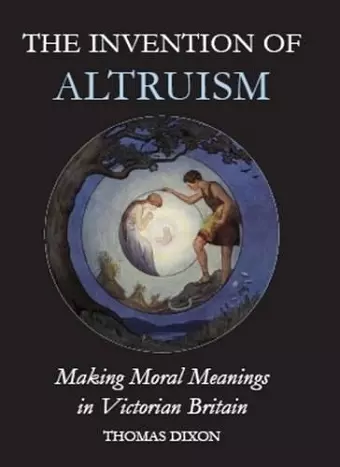The Invention of Altruism
Making Moral Meanings in Victorian Britain
Format:Hardback
Publisher:Oxford University Press
Published:8th May '08
Currently unavailable, and unfortunately no date known when it will be back

Altruism' was coined by the French sociologist Auguste Comte in the early 1850s as a theoretical term in his 'cerebral theory' and as the central ideal of his atheistic 'Religion of Humanity'. In The Invention of Altruism, Thomas Dixon traces this new language of 'altruism' as it spread through British culture between the 1850s and the 1900s, and in doing so provides a new portrait of Victorian moral thought. Drawing attention to the importance of Comtean positivism in setting the agenda for debates about science and religion, this volume challenges received ideas about both Charles Darwin and Herbert Spencer as moral philosophers. Darwin saw sympathy and love, not only selfishness and competition, throughout the natural world. Spencer was the instigator of an Anti-Aggression League and an advocate of greater altruism in Britain's dealings with the 'lower races'. It also sheds light on the rise of popular socialism in the 1880s, on the creation of the idealist 'altruist' in novels of the 1890s, and on the individualistic philosophies of Friedrich Nietzsche, Oscar Wilde, and G. E. Moore - authors considered by some to be representative of fin de siècle 'egomania.' This wide-ranging study in the history of ideas is highly relevant to contemporary debates about altruism, evolution, religion, and ethics.
Thomas Dixon has written a remarkable history... His superb volume...is the single best study of the emergence of new moral and social terminology in the Victorian age... Imaginatively researched, carefully argued and finely written, this is a volume which scholars from a variety of disciplines will be able to engage, contest and build upon. * Frank M. Turner, British Journal for the History of Science *
Subtle, broad-ranging, and elegant...a compelling new interpretation of the intertwined histories of moral philosophy, natural science, and religious thought. This witty but weighty book has a great deal to offer both historians and literary critics. * Seth Koven, Victorian Studies *
The substance of the book is comprehensively researched...He brings it together cogently enough to tell a gripping story. The result is an effective and important contribution to our understanding of Victorian thought * John Skorupski, Times Literary Supplement *
The Invention of Altruism is extremely useful, illuminating not just the spread of the terminology of altruism, its paradoxes and ambiguities and the several concepts understood by different groups to be contained within it, but also the broader intellectual contexts of the late-nineteenth century. * Mark Blacklock, Interdisciplinary Studies in the Long Nineteenth Century *
The Invention of Altruism is ambitious in scope, and full of suggestive discussion of important themes. * Jose Harris, London Review of Books *
Dixon's comprehensive study is to be welcomed as a major contribution to our understanding of the subject... The structure of the book is elegantly simple, and makes what might have been an intricate work highly readable and surprisingly easily navigable. * Professor Stuart Jones, Reviews in History *
Well-argued and compelling * Ilana Krausman Ben-Amos, American Historical Review *
this is certainly a book from which literary critics, as well as practitioners of a broad range of disciplines pertaining to intellectual history, will benefit greatly, both for the new light it casts on a key term in Victorian moral philosophy and its subtle and stimulating treatment of related historiographic issues * Gowan Dawson, Intellectual History Review *
Dixon does a splendid job of bringing to life a huge cast of characters and of marking out the subtle differences and hidden commonalities which animated the discussions. Anyone interested in Victorian thought will find it not only rewarding but delightful to spend some time with his book. * Leslie Armour, British Journal for the History of Philosophy *
The Invention of Altruism is a big book which imparts a great deal of information about people, books, ideas and politics. Its substantial and varied range of material is skilfully handled through Dixon's lucid style and clearly stated methodology. Certainly one of the real joys of this book is how - rather like George Eliot in her effort to make literary realism render the complex web of life - it values a whole cast of protagonists, minor as well as major. Canonical figures such as Darwin and Spencer are joined by others of widely varying visibility. ... The journey is exhilarating and revealing, and encompasses figures rarely met in intellectual histories...In addition, in his book's boundless curiosity in following 'altruism' beyond the writers who normally dominate intellectual histories...Dixon also shows that intellectual history can be strikingly good cultural history. * Carolyn Burdett, History Workshop Journal *
The Invention of Altruism: Making Moral Meanings in Victorian Britain is a rare scholarly treat. Serious and entertaining, it makes an important contribution to our understanding of the Victorians and reminds us that they are responsible for the ethical distinctions we make between altruism and egoism. * Angelique Richardson, Critical Quarterly *
thoughtful, deeply researched book ... an important book that all students of late-Victorian culture should read. * Thomas William Heyck, The European Legacy *
ISBN: 9780197264263
Dimensions: 242mm x 162mm x 33mm
Weight: 804g
440 pages